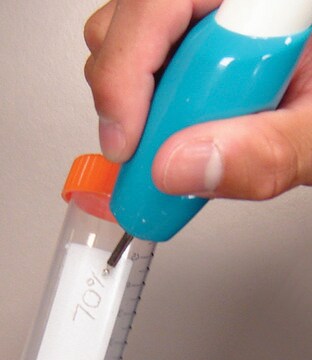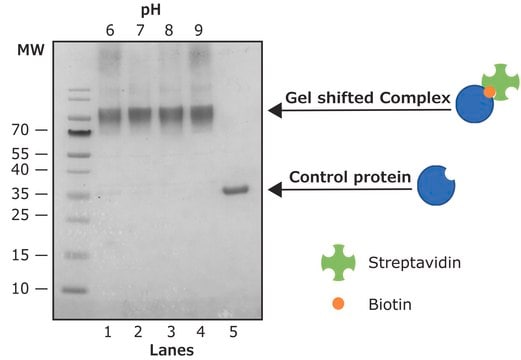All Photos(1)
About This Item
UNSPSC Code:
12352203
eCl@ss:
32160702
NACRES:
NA.41
clone:
polyclonal
application:
ELISA
IF
IHC
WB
IF
IHC
WB
species reactivity:
human
technique(s):
ELISA: suitable
immunofluorescence: suitable
immunohistochemistry: suitable
western blot: suitable
immunofluorescence: suitable
immunohistochemistry: suitable
western blot: suitable
citations:
8
Recommended Products
biological source
goat
Quality Level
antibody form
purified immunoglobulin
clone
polyclonal
species reactivity
human
manufacturer/tradename
Chemicon®
technique(s)
ELISA: suitable
immunofluorescence: suitable
immunohistochemistry: suitable
western blot: suitable
shipped in
wet ice
Specificity
Rotavirus (ICP′s and late structural virion antigens). Greater than 90% reactive with human rotaviruses. Non reactive with HEp-2 cells and WI-38 cells.
Immunogen
Bovine (Nebraska Calf Diarrhea Virus)
Application
Indirect immunofluorescence: 1:250
ELISA
Immunoblotting; unboiled samples in 1mM DTT and 2% SDS only.
Immunohistochemistry
Final working dilutions must be determined by end user.
ELISA
Immunoblotting; unboiled samples in 1mM DTT and 2% SDS only.
Immunohistochemistry
Final working dilutions must be determined by end user.
Research Category
Infectious Diseases
Infectious Diseases
Research Sub Category
Infectious Diseases - Viral
Infectious Diseases - Viral
This Anti-Rotavirus Antibody is validated for use in ELISA, IF, WB, IH for the detection of Rotavirus.
Physical form
Format: Purified
Purified immunoglobulin. In PBS (0.01 M, pH 7.2) with 0.1% sodium azide
Storage and Stability
Maintain at -20°C in undiluted aliquots for up to 12 months. Avoid repeated freeze/thaw cycles.
Legal Information
CHEMICON is a registered trademark of Merck KGaA, Darmstadt, Germany
Disclaimer
Unless otherwise stated in our catalog or other company documentation accompanying the product(s), our products are intended for research use only and are not to be used for any other purpose, which includes but is not limited to, unauthorized commercial uses, in vitro diagnostic uses, ex vivo or in vivo therapeutic uses or any type of consumption or application to humans or animals.
Storage Class Code
12 - Non Combustible Liquids
WGK
WGK 2
Flash Point(F)
Not applicable
Flash Point(C)
Not applicable
Certificates of Analysis (COA)
Search for Certificates of Analysis (COA) by entering the products Lot/Batch Number. Lot and Batch Numbers can be found on a product’s label following the words ‘Lot’ or ‘Batch’.
Already Own This Product?
Find documentation for the products that you have recently purchased in the Document Library.
Wook-Jin Park et al.
Scientific reports, 11(1), 22037-22037 (2021-11-13)
Conjugate vaccine platform is a promising strategy to overcome the poor immunogenicity of bacterial polysaccharide antigens in infants and children. A carrier protein in conjugate vaccines works not only as an immune stimulator to polysaccharide, but also as an immunogen;
Na Yin et al.
Human vaccines & immunotherapeutics, 17(12), 5656-5665 (2022-02-27)
Live-attenuated rotavirus vaccine has shown low protection in underdeveloped or developing countries. However, the inactivated rotavirus vaccine may have the potential to overcome some of these challenges. In the present study, the immunogenicity and protective efficacy of a bivalent inactivated
Christina McCowan et al.
PloS one, 13(9), e0203853-e0203853 (2018-09-12)
Cases of vomiting and diarrhoea were reported in racing pigeons in Western Australia in May, 2016. Morbidity and mortality rates were high. Similar clinical disease was seen in Victoria in December and by early 2017 had been reported in all
Mai Kishimoto et al.
Journal of virology, 97(1), e0145522-e0145522 (2023-01-13)
Rotavirus A (RVA) causes diarrheal disease in humans and various animals. Recent studies have identified bat and rodent RVAs with evidence of zoonotic transmission and genome reassortment. However, the virological properties of bat and rodent RVAs with currently identified genotypes
Na Yin et al.
World journal of gastroenterology, 24(45), 5109-5119 (2018-12-21)
To establish a rotavirus (RV)-induced diarrhea model using RV SA11 in neonatal rhesus monkeys for the study of the pathogenic and immune mechanisms of RV infection and evaluation of candidate vaccines. Neonatal rhesus monkeys with an average age of 15-20
Our team of scientists has experience in all areas of research including Life Science, Material Science, Chemical Synthesis, Chromatography, Analytical and many others.
Contact Technical Service








